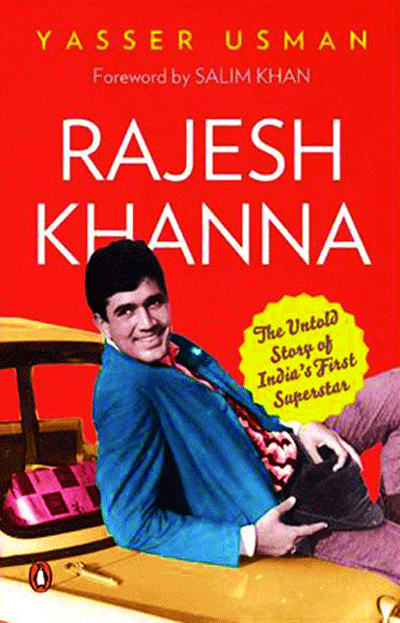Yasser Usman’s biography of Rajesh Khanna reveals unheard childhood stories about the actor. The author tells Karan Bhardwaj how the superstar was a true-blue Punjabi and that he was the highest paid actor for over a decade
Rajesh Khanna was a hurricane in early 70s that turned everything into gold that came its way. While stories of him being an arrogant superstar and that his delusional attitude caused downfall of his stardom are like a well-known novella, little do people know that the 70s blue-eyed man had a traumatic childhood that led to his sheer audacity. It was never the success of his golden-jubilee movies that got into his head but a troubled early life that shook him up entirely even before he stepped into filmdom, says author and journalist Yasser Usman, who has written a biography of the actor titled The Untold Story of India’s First Superstar.
The book, written much like a novel, provides insight into the actor’s childhood life besides his movies and super successful stint in Bollywood. Yasser interviewed many people close to the star and dug old piles of media coverage that drew actor’s public persona.
“Rajesh Khanna exemplified the real definition of stardom. He was a rockstar of Indian cinema. People from abroad would come specially to see him. But he, as a person, was an outcome of a series of loss. Since childhood, he was left alone or abandoned by people he loved. So he became possessive in nature. When he was barely five or six, he was given away by his parents.
He could never come to terms with this loss that he become a foster child,” says Yasser, who collected a lot of intriguing stories while covering the actor’s funeral. In his research, he relied heavily on media interviews and also met Khanna’s close aides. “like any other movie buff, I too had limited knowledge about him depending on what we have heard or read in media. But I got shocked when I met his friends and family who introduced me to a Rajesh Khanna who I never knew. They gave a different perspective of the actor, who was suddenly a true-blue Punjabi, a kind-hearted soul and an epitome of loss and possession,” he says.
Rajesh hardly spoke about his painful childhood in his interviews. In fact, he once gave fictitious names to his sisters in a media byte. “Rajesh was born in Punjab at a time when sharing of children was quite common. It left a lot of bitterness in them. Rajesh was one child who couldn’t accept this transaction. Things worsened when his real parents also shifted to Mumbai which left him utterly confused. He couldn’t sustain long relationships with his girlfriends or friends which made him even more bitter,” says Yasser.
The actor’s failed marriage with Dimple Kapadia made headlines when Dimple eventually decided to walk out of his house. In an interview, Dimple had stated how their relationship had died and that their conversations were only about children. Once, Rajesh came back from work and the couple sat for a couple of hours. But none of them uttered a single word.
That was the day when Dimple realised the end of her marriage. Rajesh was known to be possessive and he wanted to control every move of his wife — from what she would eat to what she would wear, leave alone who she would have to meet with. “It happened because there was a sense of loss in him. He believed that everything that belonged to him was forcefully taken away. He controlled his wife who also left him. His stardom and his fans faded away with time. All of this only added to his wounds. He was like, I will do whatever I want and I’m not accountable to anybody’,” he says.
Rajesh Khanna left indelible impact on his films, fans and friends. All his girlfriends also spoke very fondly about him and came back when he died. Prashant Kumar Roy, a close associate of the actor confided that Rajesh, who was otherwise a very gentleman, never spoke about his family or parents to anybody. He would only introduce Narendra Kumar as his elder brother.
On movies’ front, Rajesh didn’t take his fading stardom very politely. His rapport with Amitabh Bachchan took a severe blow even though they worked together in a handful of movies. Amitabh was a rising star and received overwhelming response in Anand (1971) and Namak Haraam (1973).
WhenNamak Haraam was being made, director Hrishikesh Mukherjee shot all of Amitabh Bachchan’s scenes before Rajesh’s. When the footage was shown to distributors (it was a common practice then to take distributors in confidence while making the movies), they ridiculed Amitabh Bachchan and hoped on Rajesh Khanna’s performance.
“Rajesh did whatever he could do to become the talking point of Namak Haraam. Though both the actors delivered stellar performances, Amitabh Bachchan finally walked away with the cake. It’s known that Rajesh insulted Bachchan time and again but Bachchan never retaliated, at least on the records,” says Yasser.
The author contests perception that Rajesh’s success was short-lived. As the fact goes, he was the highest paid actor from 1969 to 1983. “His stardom lasted till 1986 but he continued to behave like a star till his last day. Even when he was doing television shows, producers would lament how he would ask for scripts in advance and rehearse his scenes in the presence of his previous movie directors and producers. “He was the only star who never called directors for work even he was not doing fine. His rival Amitabh Bachchan called Yash Chopra for work when he ran bankrupt but Rajesh could never have a second innings,” says Yasser.


























